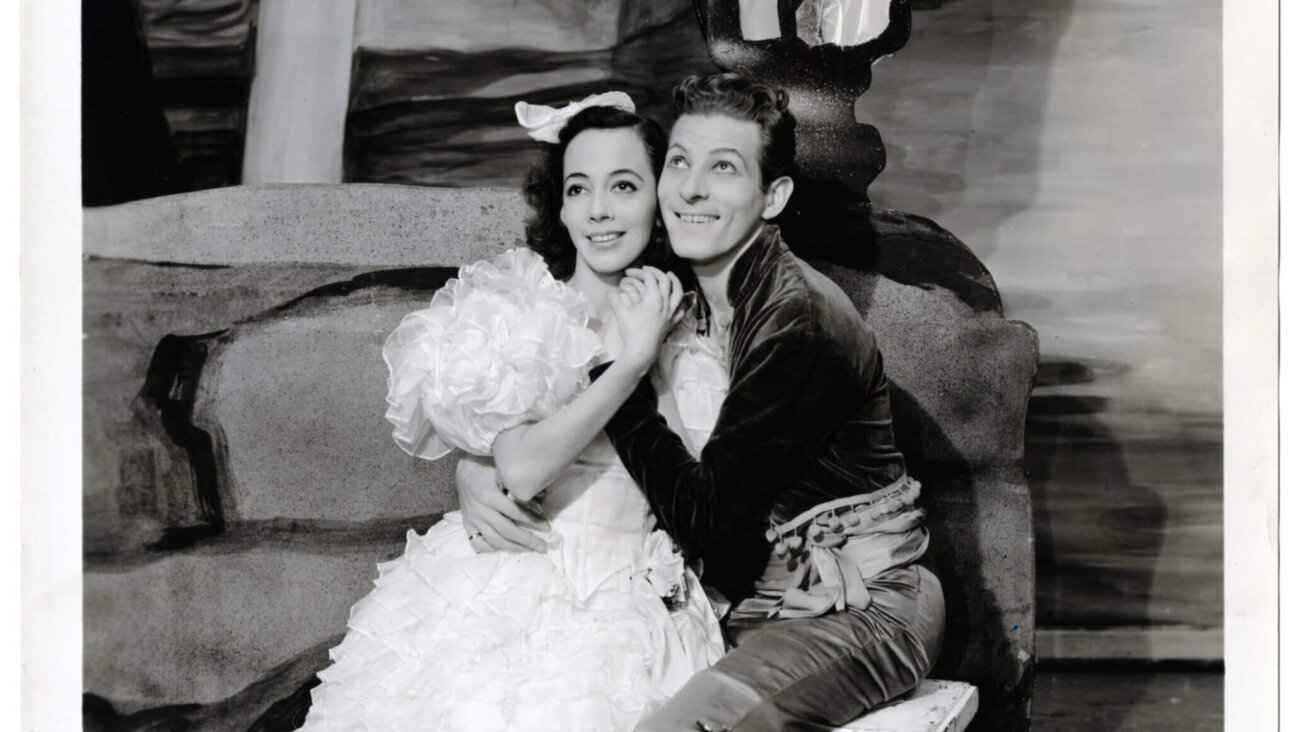Unstunned

Sapphic Satire: The ironically named Blanche (Charlayne Woodard) does not gild the Lily (Cristin Milioti). Image by ERIN BAIANO
Brooklyn’s community of Syrian Jews — defensive, insular, affluent and bound by a 75-year-old edict that forces excommunication upon anyone intermarrying — is a big and mysterious subject, one ripe for dramatizing. Zev Chafets’s excellent article about it, “The Sy Empire,” which ran in The New York Times Magazine in 2007, had odd and arresting details that could fill more than one film, play or novel. There could be a miniseries about the scandal over the Crazy Eddie consumer electronics chain (owned by Syrian Jews) alone.

Sapphic Satire: The ironically named Blanche (Charlayne Woodard) does not gild the Lily (Cristin Milioti). Image by ERIN BAIANO
So it was intriguing to know that the subject had been dramatized in June in a play called “Stunning.” Written by David Adjmi, a child of (and apparently a refugee from) this fierce, protective and, it seems at times, cruelly clannish environment, “Stunning” ended its run at The Duke on 42nd Street theater on July 11.
To put it mildly, Adjmi didn’t take a documentary approach to his home community; in fact, he wrote a satirical melodrama — entertaining if crude, schematic and derivative — to tell the tale of a young Syrian-Jewish woman’s awakening.
Lily (Cristin Milioti) is turning 17 as the play starts, but seems even younger: a practically embryonic girl, painfully overshadowed by her tough, intimidating sister, Shelly (Jeanine Serralles), and by her older, gangsterish husband, Ike (Danny Mastrogiorgio), to whom she was virtually promised at the age of 12. Without volition, she enters a world of manicures, tanning and early pregnancy, dictated to by an aggressive and acquisitive patriarchy.
That is, until she hires a cleaning woman.
Blanche (Charlayne Woodard) is an African-American lesbian, a strangely enigmatic academic looking to make fast cash before she can find a job in her field. Speaking French and dropping names from Cornel West to bell hooks, she at first alienates and angers the suspicious (and racist) Lily.
Then Ike goes on a trip to China to inquire about sweatshops for the jeans business run by Lily’s brother-in-law, Jojo (Steven Rattazzi). In his absence, Blanche educates Lily about more than just linguistics (the other subjects including wine drinking, birth control and bisexuality), causing the girl to grow up physically and emotionally, and threatening the strangulating social order in which she lives.
From the first brightly lit, broadly played moments, it’s clear that subtlety will not be the tone of “Stunning,” — neither in Adjmi’s script nor in Anne Kauffman’s lively, flashy, obvious production. Lily, Shelly and a friend (Sas Goldberg) yammer at each other — every other word about every other thing is “stunning” — blatant JAPs in the age-old style of the notorious (and funnier) wedding scene in the movie version of “Goodbye, Columbus” or the “Jewess Jeans” sketch from the original “Saturday Night Live.” Since “Stunning” lacks the freshness or shock of those two “ancient texts,” from the get-go it merely recycles the same kind of satirical take seen so often since then in “Curb Your Enthusiasm,” “South Park” and even “The Sopranos” (in which the portrayal of Italian trophy wives and daughters had much more complexity and power).
Lily’s subsequent scenes with Ike — he coarse, she weak; or later, he coarse, she rebellious — also strike cartoonish notes and strike them loudly. While Milioti and Mastrogiorgio are gifted actors, they’re hamstrung by writing and directing that make them two-dimensional types instead of people, though Milioti in particular has moments of comic ingenuity and pathos. (More effective are the scenes with Serralles, whose performance is ferocious and hilarious, and her part not big enough for her to overstay her welcome.)
To his credit, Adjmi tries to avoid the obvious in his writing of Blanche, not making her a warm, sagacious black person teaching white people, in the “Driving Miss Daisy” tradition (a movie comically referenced). Yet in Woodard’s strangely manic and mannered performance (not helped by her overwrought, essentially unplayable final scenes and a revelation of her past that is, if possible, both predictable and somewhat unclear), she immediately emerges as another cliché: the seductive interloper, dissembling and up to no good, a gay, black shadow figure that owes a debt to “Six Degrees of Separation.”
And that play isn’t the only work of which “Stunning” is reminiscent. Once Lily is liberated, her plaintive insistence on her and Blanche’s future
together feels like a kosher “Boys Don’t Cry.” Blanche’s very name intentionally brings to mind the “A Streetcar Named Desire”-like quality of Lily and Ike’s relationship, as does the play’s unearned tragic ending. (In her wifebeater T-shirt, the housekeeper could be both Blanche and Stanley.)
Lily’s transformation by way of learning and love repeats the familiar patterns of “Born Yesterday,” “Educating Rita” and other “Pygmalion” riffs. While Adjmi occasionally undercuts these clichés with parody (Lily reading Roland Barthes is a sight gag), he mostly traffics in them: Sexual and intellectual freedom give Lily less of a New York accent and more subdued hairstyles and clothing options.
Suffice it to say the hair and Miranda Hoffman’s costumes capably serve the production’s needs, the latter particularly witty in Shelly’s severe yet chic Mao getup after her trip to China. And David Korins’s set deftly captures Lily’s symbolically all-white home, both sterile and vulgar, with a wrap-around two-way mirror that neatly is both transparent and reflective, to counterpoint the characters’ seeing/not seeing themselves.
But despite these high-style trimmings — and the occasional funny line — the mechanical events and thematic callbacks of “Stunning” proceed with a writer’s workshop efficiency that crowds out real invention and feeling; rest assured, if a gun is introduced, it will be used; so will a pan of white paint. And a purely symbolic supernatural subplot remains painfully undeveloped.
Worst of all, Adjmi neglects the specificity of the Syrian Jews’ particular, peculiar world; even though he includes their need to see themselves as white, not Middle Eastern, he largely creates an environment that, child marriage aside, could be Long Island’s Great Neck or Roslyn, or any other rich Jewish neighborhood, diluting his subject matter with over-familiarity.
Consequently, the compelling story of Brooklyn’s Syrian Jews — who are, as Chafets writes, “willing and able to sacrifice their children” for the sake of unity — is still waiting to be told.
Laurence Klavan is a playwright and novelist living in New York City.

I hope you appreciated this article. Before you go, I’d like to ask you to please support the Forward’s award-winning journalism this Passover.
In this age of misinformation, our work is needed like never before. We report on the news that matters most to American Jews, driven by truth, not ideology.
At a time when newsrooms are closing or cutting back, the Forward has removed its paywall. That means for the first time in our 126-year history, Forward journalism is free to everyone, everywhere. With an ongoing war, rising antisemitism, and a flood of disinformation that may affect the upcoming election, we believe that free and open access to Jewish journalism is imperative.
Readers like you make it all possible. Right now, we’re in the middle of our Passover Pledge Drive and we need 500 people to step up and make a gift to sustain our trustworthy, independent journalism.
Make a gift of any size and become a Forward member today. You’ll support our mission to tell the American Jewish story fully and fairly.
— Rachel Fishman Feddersen, Publisher and CEO
Join our mission to tell the Jewish story fully and fairly.
Our Goal: 500 gifts during our Passover Pledge Drive!























